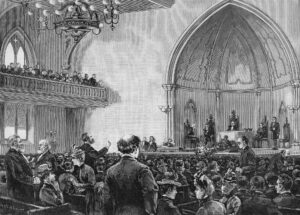I read C.S. Lewis’s autobiography, Surprised by Joy, sometime in the early 2000’s. It was before social media’s substantial presence, or at least before I had become aware of it. Still, even then when my world was only as big as my small high school and my contact list on MSN Messenger, the following sentence from the that book landed on me with some kind of strange and resounding force, like I knew exactly what he meant. Listen to these words:
“While friendship has been by far the chief source of my happiness, acquaintance or general society has always meant little to me, and I cannot quite understand why a man should wish to know more people than he can make real friends of.”[1]
It is a strange world we currently live in where we put such value on having a high number of shallow relationships. Apparently, it’s the same strange world that Lewis lived in, even without social media. It makes me think that (maybe) the problem is as old as humans; maybe it has always been in our nature to want to be (or at least be seen as) the person with lots of friends. And to be fair, maybe “problem” is the wrong language. Maybe it’s not a problem. I mean Lewis’ himself doesn’t exactly call it a problem. He simply expresses his perplexity over it, and without saying the word, asks ‘Why.’
At the Expense of the Other
Consider that question for a moment. Why do so many of us want to have such a swath of friends, online or otherwise when we can’t possibly know them all deeply? And furthermore, why do we want to have so many surface level relationships, when actually they are taking away from our capacity to know a few people deeply.
This may be reading too much into Lewis’ words, but I think he understood this about humanity: that we all have a certain carrying capacity for deep relationships. We only have so much mental, emotional and social energy to expend, so the wider we spread ourselves relationally the shallower each relationship inevitably becomes. I think it is actually out of this understanding that Lewis brings up his bewilderment.
If you only have a capacity for five or ten or twenty deep friendships, and if too many friendships beyond that starts to take away from the depth of those five or ten or twenty, then why would you want to still know even more people?
But why?
Don’t mishear me or Lewis. I don’t think He is suggesting that we ignore everyone that is beyond our deep-relationship capacity. There would be nothing Christ-like about that. Christ himself, while on earth, pursued a small group of deep relationships, and yet still made himself available for everyone that approached. That is our example, and that was Lewis’ example.
Still, Lewis is perplexed over the all-too-common desire to go wider rather than deeper? Why do we want the one even at the expense of the other? Or again, why would a man “wish to know more people than he can make real friends of?”[2]
Its a valuable question for us to ask, especially in our age of social media when so many of us spend so much time scrolling through the news feeds of “friends,” and involving ourselves in the lives of people we actually don’t know, and all of it at the expense of real relationships.
And to be honest, I don’t have the answer. But I am intrigued and struck and challenged by the question.
[1] C.S. Lewis, Surprised By Joy, (HarperCollins: New York, 1955), 28.
[2] C.S. Lewis, Surprised By Joy, (HarperCollins: New York, 1955), 28.
























